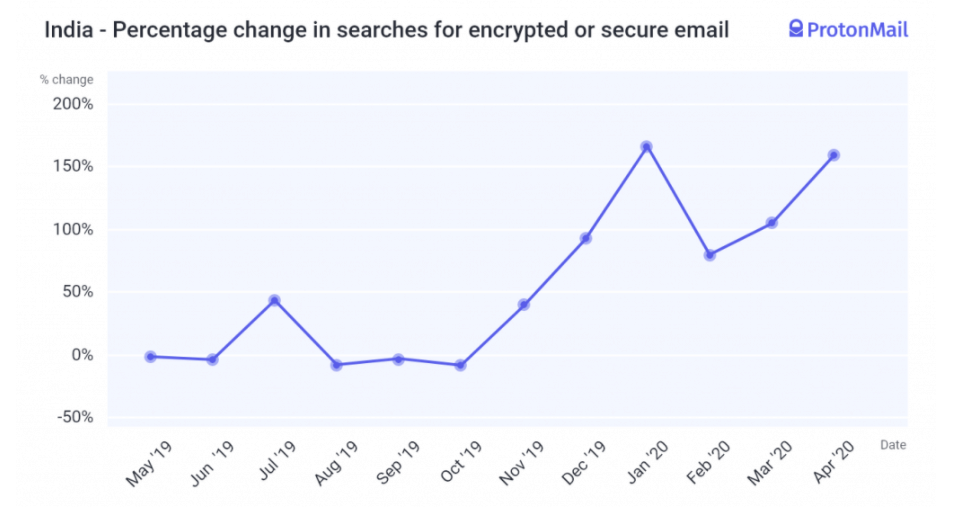New Delhi: Switzerland-based ProtonMail, which claims to be the “world’s largest encrypted email provider”, released research that showed there was a “155% increase in Indians searching for secure or encrypted email in the last 12 months”.
The research looks at the 12-month period between May 2019 and April 2020, and is based on Google Keyword Planner, part of Google’s ad service that helps determine what keywords should be used in ads.
ProtonMail’s founder CEO Andy Yen said, “As consumers have gotten more savvy about how Google abuses privacy for profit, more of them are turning to Gmail alternatives which put privacy first.”
Talking about the research, that was released on 9 September, he added, “The expansion of remote working as a result of Covid has also driven companies to seek out more secure communications solutions such as encrypted email. Both of these factors have contributed to the increased interest in services such as ProtonMail.”
ThePrint emailed Google for a comment on the findings and the alleged abuse of user privacy. The report will be updated when a response is received.
Pegasus hack, pandemic affect Indian behaviour
For India, the research looked at the average number of searches in a given month for keywords like “encrypted email”, “secure email”, “no ads email”, “safe email”, and “private email”.
According to ProtonMail research, in May 2019, the total number of searches for these keywords was 2,550. By April 2020, this number rose to 6,510. Hence, the percentage increase in searching for these keywords went up by 155 per cent.
Cyber crime investigator Ritesh Bhatia said the interest in searching for encrypted mail around November 2019 coincided with when the Pegasus hacking WhatsApp scandal broke.
The scandal, which came to light towards the end of October, was that Indian WhatsApp users had been hacked using Pegasus malware.
According to ProtonMail’s research, the second time interest in secure or encrypted email rose was during March 2020 when the Covid-19 pandemic forced people to socially distance and resort more to electronic communications like email and chat services.
Also reads: The rise of Pegasus and why India should know the problem with hiring ‘internet mercenaries’
Trending keywords
According to the survey, the keywords ‘encrypted email’ and ‘secure email’ were searched the most. In October 2019, for example, the average number of searches for ‘encrypted email’ was 590. This rose to 880 in November 2019, rose higher to 1,900 searches in December 2019, and increased even more to 2,900 in January 2020.
In February 2020, the number of searches for ‘encrypted email’ dipped to 1,900 and remained here in March 2020. By April 2020, it rose to 2,400 when the lockdown was in full effect.

During the same time period, the keyword ‘secure email’ was searched as well. In October 2019, there were 720 searches for ‘secure email’. This rose to 1,300 in November 2019, then to 1,600 in December 2019 and even higher to 2,400 searches in January 2020.
The number dipped in February 2020 to 1,300, but increased again in March 2020 to 1,600. This trend continued in April 2020, registering 2,400 searches during the pandemic-induced lockdown.
Also read: Payments processor NPCI had over 40 security risks, user data vulnerable, says 2019 govt audit
Google connect
ProtonMail sought to link the rise in interest in encrypted mail to how users were looking for safer alternatives to Gmail, noting “Gmail is not private — not even in confidential mode”.
ProtonMail’s blog notes that five days after Gmail was launched in 2004, civil liberty organisations said Google should stop scanning user messages for ad placements.
In 2018, Google admitted that it allowed app developers to scan Gmail accounts for ad targeting. The tech giant’s email client is the most “dominant” email service with over 1.5 billion global active users.
“While Gmail is a secure enough service, there’s a risk extensive data on you is collected by Google across its various services like Google assistant, which most users allow microphone access to, and your Google search history,” Bhatia said.
ProtonMail has over 10 million users since it was founded in 2014 in Geneva by scientists who met at the European Organization for Nuclear Research (CERN).
While ProtonMail says it “protects millions of accounts used by journalists, activists, doctors, lawyers, businesses, and ordinary citizens”, Bhatia said the service is probably also used by cybercriminals since it is encrypted.
The encryption means ProtonMail cannot see the content of messages. “Even if we wanted to, we cannot access the content of your messages because we use end-to-end encryption and zero access encryption,” the firm stated.
Also read: Monopoly in the name of privacy: How Google is slowly closing its advertising ecosystem







do not use other messengers, use utopia ecosystem, then your data will be protected, and not walk on the Internet
Thanks Mr Robot Series ??